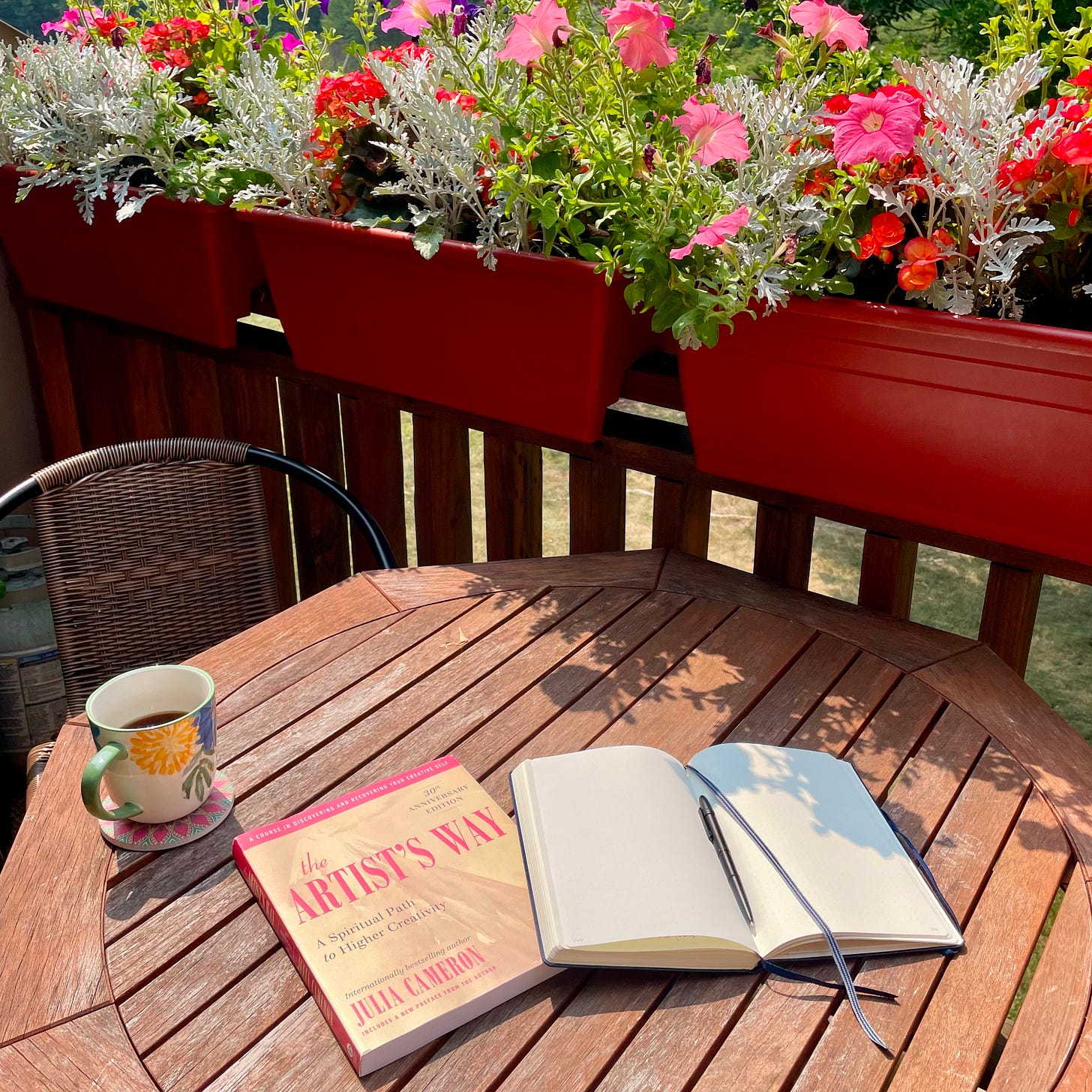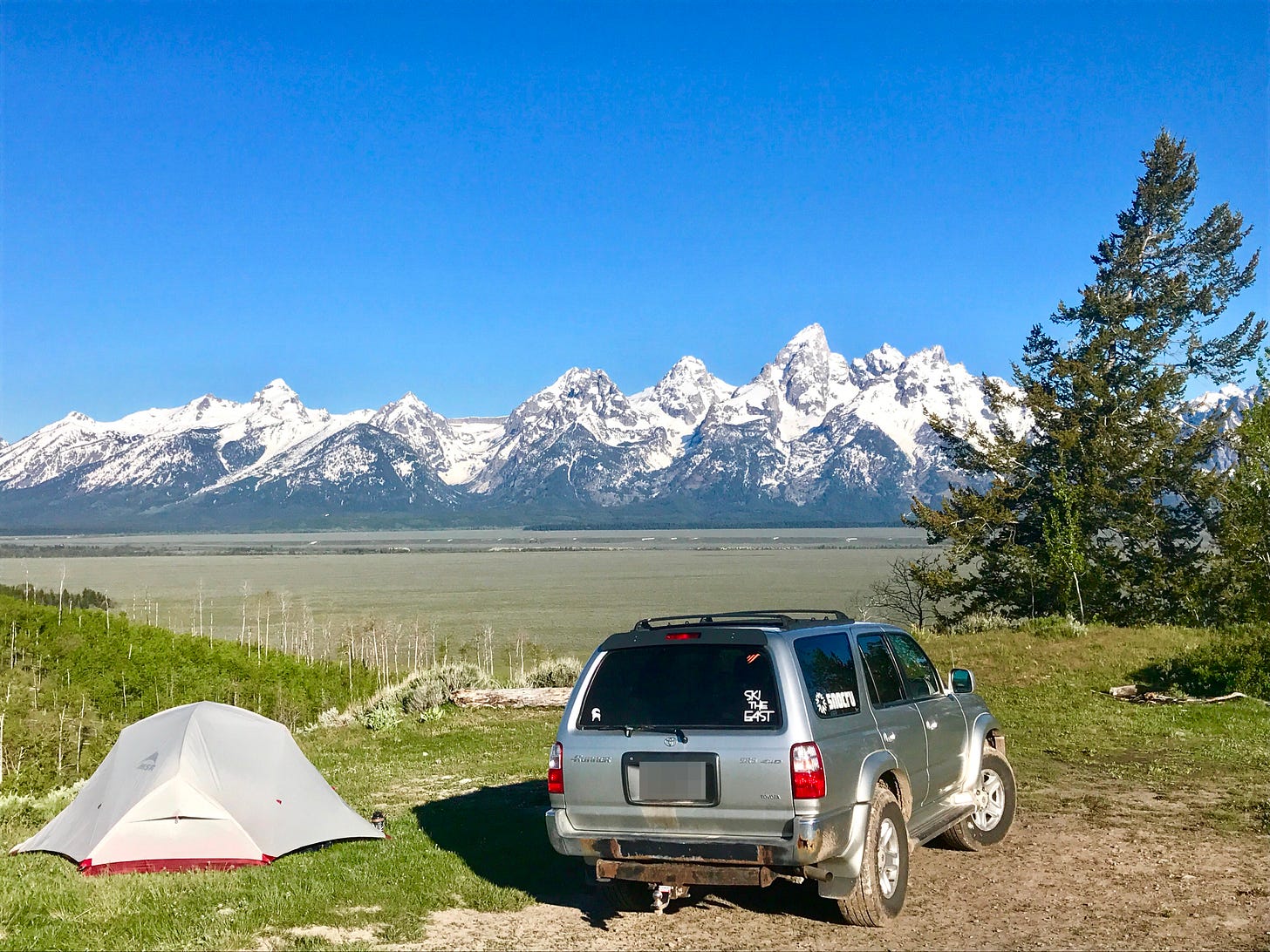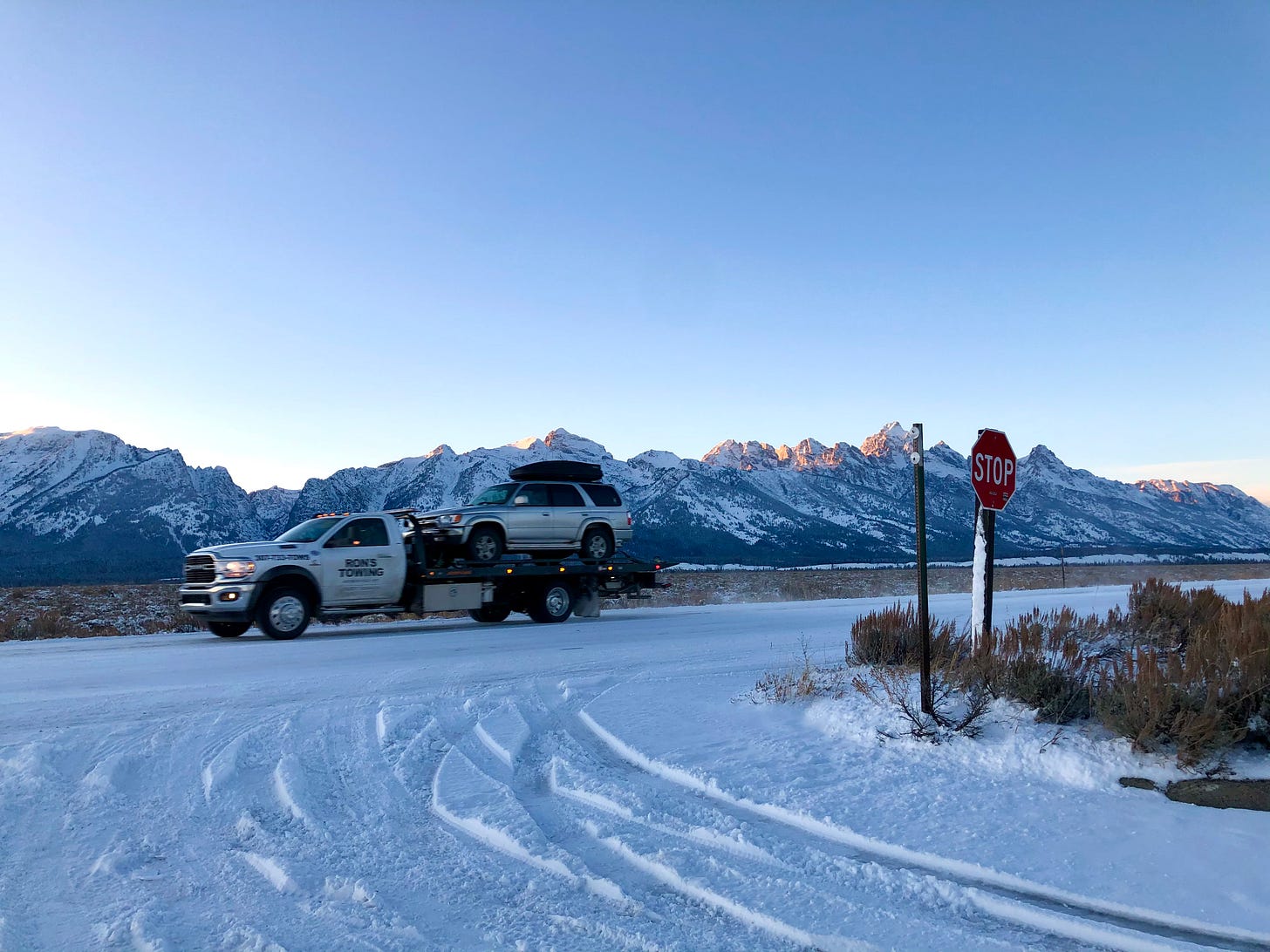An Artist's Way Of Starting Over
Wanting a clean slate doesn't mean getting one.
Purposefully throwing away a life you’ve worked hard for might be controversial, but I dreamt of burning mine to the ground for years. Give myself a do-over. Go somewhere new, even if it meant never getting that house in the suburbs or moving up at a 9-5 to keep paying for it. I longed for a fresh start. Finally be the me I couldn’t in my so called “practical life.”
Plenty of people reinvent themselves without wrecking everything in the process, though. They do it surrounded by friends. Start trying new hobbies, maybe change careers—show up as in-progress versions of themselves like it’s nothing. I simply didn’t understand how that could be possible. But I’ve also seen Into The Wild, so I knew how things turned out when Chris McCandless went searching for a new life… not super promising.
We love to root for the underdog. Those kinds of movies we’ll rewatch time and again. We cheer loudly for reinvention with our words, but do we actually mean it?
It doesn’t seem like it.
Daydreaming about a new life helps make our real one bearable, until it doesn’t.
We feel we’re supposed to prioritize structure and stability. Yet, we long for more room to breathe. If we woke up tomorrow with an unlimited bank balance and nowhere to be, I think we’d be way more uncomfortable than we’d ever admit. Seriously. We’d be forced to recognize just how much we truly and fundamentally don’t know what we want out of life.
I’ve written about learned helplessness before because people never seem to tell the whole story with that. For starters, it’s rooted in a fear of rejection, not laziness. And that’s the part that almost always gets left out. Failure is supposed to be a process of trying again… but associating failure with punishment and rejection creates fear, not encouragement. So if we want to build resilience, we need environments that reward failure instead of punishing it.
Yet, resilience is a paradox:
→ learning to fail requires a lot of failing.
→ getting good at it requires positive feedback.
So that’s the hurdle all of us are up against, it seems. Which is why we keep saying we’ll get to that passion project or go on that trip—but only after our side-business is up and running. That way our travel will basically fund itself. It’d be fool-proof, if we could actually find some spare time to start it.
But we don’t.
We enjoy brainstorming the endless possibilities, though. Much safer to bully ourselves, instead of letting other people see us fail…
We dream of freedom but tether ourselves to practicality.
Leaving the grocery store this week, a mild existential crisis was waiting for me at my car. I’d found an early 2000s silver Toyota 4Runner parked directly next to me. This brought a huge smile to my face. But, just as quickly, it also made my stomach lurch.
I used to have one just like it named Trudy.
That 4Runner had been my chance at a new life. One like I’d always dreamed about—where I could start fresh. Finally get some breathing room from enmeshed family drama, hospital visits, and funerals. So Trudy and I’d driven across the country back in 2016, after taking a marketing job, sight unseen, in some middle-of-nowhere Wyoming town.
Moving a couple thousand miles away meant real, physical boundaries for the first time in my life. For a hypervigilant kid who’d grown up anticipating other people’s needs ahead of his own, Wyoming seemed like an escape where I could finally create my own dream life in the mountains.
Over the years that followed, that’s exactly what I did. So seeing that silver 4Runner parked next to me this week brought back an onslaught of great memories. But it also catapulted me right back to one of the ones I’d tried to brush aside.
Almost 5 years ago to the day, I’d been on my hands and knees in Jackson, Wyoming, desperately trying to scrub an oil stain out of a driveway that wasn’t mine. It belonged to my ex-girlfriend’s boss. We’d been invited to house-sit and the driveway itself was worth significantly more than my car—which had caused this whole mess.
Naturally, I was mortified. The neighbors looked on while I’d been shown the damage. Turns out they’d called her boss, he’d called her. By the time she got to me, she hadn’t seemed angry so much as fed up. All I knew was that I was done feeling small like that.
My then-girlfriend worked for a development firm specializing in upscale, residential real-estate. Which meant my rusty, 2001 silver Toyota 4Runner was parked in front of her boss’s multi-million dollar home, in a neighborhood where I clearly didn’t belong. But she did. Because while I’d been burning myself out across multiple jobs—trying to stitch together the dream life I’d escaped into—she’d lit a fire under her ass and earned a VP title.
I swear the universe was trying to tell me something, because Trudy’s engine caught fire a few months later. Fittingly, that set off the chain of events that caused me to abandon the life I’d just spent years creating. All in the name of structure and practicality.
Developing personal agency is the key to creating a life you love.
It’s surprisingly easy to find yourself in a situation where you feel trapped. Enduring it sucks, but finding ways to get yourself through something difficult is much harder. Because mental clutter piles up like dishes in the sink. So it needs to be organized like anything else, or the mess grows until you do something about it.
Later this week, after spotting that 4Runner while grocery shopping, I was catching up on emails over morning coffee. There are emails you open right away and ones you put off. But then there are the ones you save because you know you’ll need more time to enjoy them. Cate Hall’s one of those writers I save for when I can actually sit down and think. She reframes big ideas without sounding dramatic or talking down to you. So I was psyched to make time to read an email from her I’d been saving. Especially since the subject line said: “Behold, my TED talk.”
Sipping my coffee, I spent the next eight minutes and thirty seconds smiling. It was one of solidarity. In under ten minutes, Cate had explained how personal agency—not structure, discipline, or even sobriety by itself—allowed her to create a life she loves. I listened to her talk with one of her recent essays in mind. It’s called Fuck Willpower.
In it, Cate says, “Willpower is an incoherent concept invented by smug people who think they have it in order to denigrate people who they think don’t.”
I mean… c’mon… just—slow clap.
As someone who is also on a journey with sobriety, Cate helped me feel truly seen. She validated the struggle of being torn between knowing what you want, and doing it. I now have four years of days where I’ve stayed sober. I’m incredibly proud of it.
Stacking small wins rewires your brain. It’s how you program it to get shit done.
I used to think I had to wake up at 4am with the Dwayne Johnsons, Mark Wahlbergs, Jocko Willinks, or David Goggins-types. You don’t. Not unless you want to, of course. But whenever you do get up, I’ve found that doing a series of small tasks create days where I feel the best.
Dr. Anna Lembke talks about how your brain is constantly recalibrating what it’s supposed to reward you for. What triggers your dopamine dispenser is somewhat up to you. Each day, our brains relearn what to prioritize. On days where I start by scrolling, I reach for more and more of it. That’s why I try my hardest to strive for things like making my bed, going for a walk, or journaling instead.
Personal agency is how you can get yourself unstuck.
Make small changes without burning your life to the ground.
After my silver 4Runner, Trudy, went up in flames, I finally did burn my life to the ground and start again. For real.
I’d always felt like I’d been playing it safe while dreaming of the life I really wanted. One full of creativity. For a long time, I’d felt stuck—as if there was some map other people were using but that I couldn’t find. That finally changed five years ago. I’d come up with a plan to make a career change. But it started while working three jobs at once. lol.
Then, four years ago, I got sober and started working only one job. I also got broken up with, and moved across the country. And all of that happened in the same week. I definitely wouldn’t recommend it. But up until then, I’d only ever tried to change my life through big dramatic, herculean efforts. Many huge, sweeping changes all at once.
When I finally stopped trying to do that, my life started to actually change in ways that made space for both creativity and stability. Three years ago, it started with a spreadsheet to track my habits and improve my happiness. That worked, so I turned it into a system for monitoring results I could actually see in real-time. Two years ago, I used that system to design a business—as well as a website, newsletter, and podcast. One year ago, I built and launched them.
It’s possible to pursue both creative expression and practical stability without burning out.
I’m sitting in a local cafe near the window, thinking about all of this and minding my own business. It’s mid-afternoon and I’m scribbling in my journal. Out of the corner of my eye, I see an older man with a balding, white-haired crown looking down at me.
He gestured to the copy of Storyworthy by Matthew Dicks on the table between us. “My daughter just got me a subscription to that” he said without preamble. So I told him I’d just recently started reading the book and wasn’t aware there was an accompanying subscription. He said he was enjoying it so far—that I should look into it. It was a short interaction but a friendly one.
At first I thought maybe he’d been itching for social connection of any kind, and had used the book as an easy-in. I wouldn’t have blamed him since I’m looking for more of that myself. But then it made me wonder why there had to be a reason. Maybe he thought nothing of it—spotting the book, commenting on it, then going about his day.
I’ve been so focused on stitching my life back together these last few years, I hadn’t realized how closed off I’d become... not just to strangers, but to small opportunities for connection in general. Like this one. I’m trying to work on being more open again, even if it feels a bit awkward at first. Dr. Daniel Siegel suggests labeling our experiences to help create awareness we can actually do something about.
Name it – give it a label.
Claim it – take ownership.
Tame it – respond with action.
If you find these as helpful as I do, feel free to try them with me. Creating your dream life take years. But I can finally admit that I’m chasing mine. And I can see real progress from the small steps I’m taking. Best of all, I’m being a whole lot nicer to myself about what it looks like to be creative.
Especially when it means starting over.
onward.
If you enjoyed reading and want more of this kind of thing, I write short reflections like it each day as part of my daily column.
Sign up to get it here.






